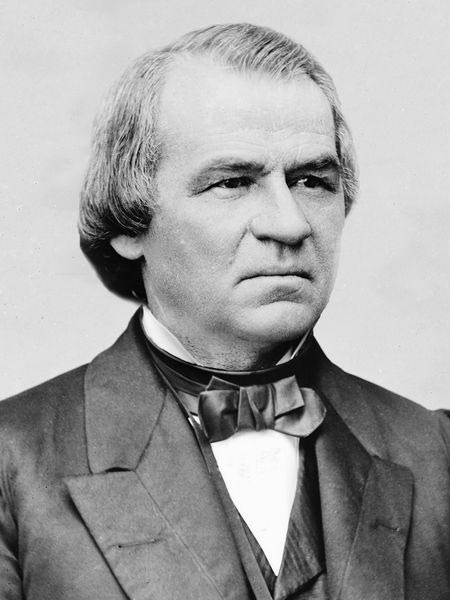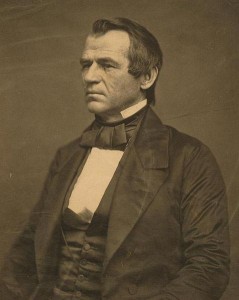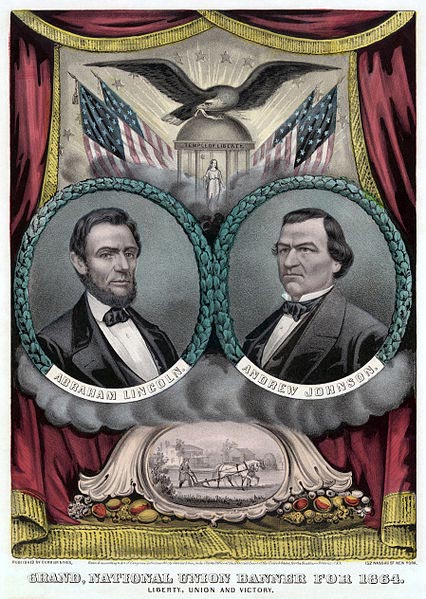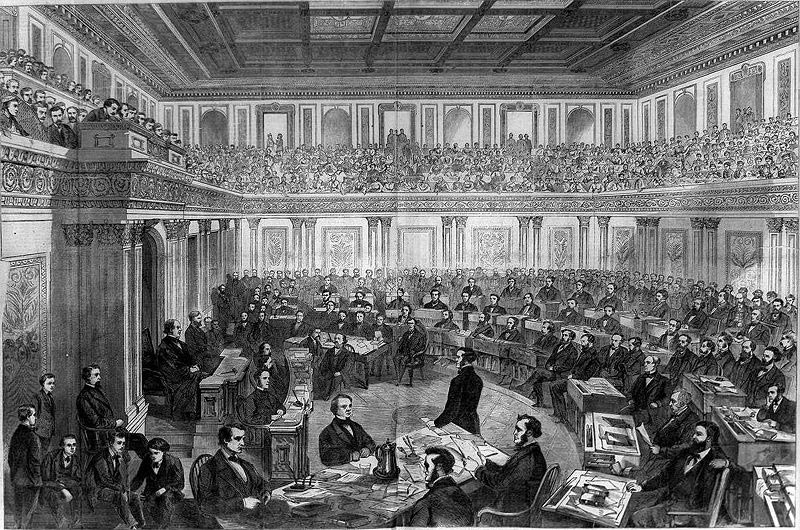| Andrew Johnson | |
|---|---|
 |
|
| 17th United States President « Previous Next » |
|
| In office | Apr. 15, 1865 – Mar. 4, 1869 |
| V. President | VP_name |
| Political Party | Democratic National Union |
| Personal Info | |
| Born | Dec. 29, 1808 |
| Died | July 31, 1875 (at age 66) |
| Religion | Irreligion, Non-Denominational Christianity |
| Profession | Tailor |
| Signature | |
| Wife | Eliza McCardle |
| Children | Martha Johnson, Charles Johnson, Mary Johnson, Robert Johnson, Andrew Johnson |
| U.S. Presidents 16-25 | |
| 16. Abraham Lincoln (1861–1865) | |
| 17. Andrew Jackson (1865-1869) | |
| 18. Ulysses S. Grant (1869-1877) | |
| 19. Rutherford B. Hayes (1877-1881) | |
| 20. James A. Garfield (1881-1881) | |
| 21. Chester A. Arthur (1881-1885) | |
| 22. Grover Cleveland (1885-1889) | |
| 23. Benjamin Harrison (1889-1893) | |
| 24. Grover Cleveland (1893-1897) | |
| 25. William McKinley (1897-1901) | |
| List of All the Presidents |
Andrew Johnson was raised in Raleigh North Carolina. He was born on December 29, 1808. He lived with his mother Mary Johnson, his father Jacob Johnson, and his older brother William Johnson in a small house made of wood within the land of Casso’s inn where his parents worked. His mother was a weaver and his father was a hostler but worked as a janitor as well in the State capitol. Andrew was youngest of the two sons. Tragically, his father died when he was 3 years old. His father managed to rescue his friends but his health deteriorated after the incident and on that same year his father died. His mother was left to take care of him and his brother William. Later on she remarried.
Andrew Johnson as a Tailor
When he was 14 years old he and his brother became the apprentice of a tailor named John J. Selby. Andrew did not attend school, but during his work as the tailor’s apprentice, their regular customers would give him books and would sometimes read oratory books to him while he works. He then taught himself to study how to read.
During his younger days along with his friends, they tossed rocks at the tradesman house, when the owner warned them that he will contact the police, Andrew got scared and went away and came to North Carolina in Carthage. Luckily, he found work there because of his skills in tailoring. Then, later he went to South Carolina in Laurens.
After one year of working in Laurens, he went back home and hoped to regain his old apprenticeship job. But John Selby did not own the shop for tailoring anymore, living without work; he and his brother William led their mother and step father in 1826 to move in Tennessee, when he was just 18 years old that time. He and his family lived in Tennessee at Greeneville, and he managed to establish his own tailor shop by putting a sign on their house door.
He then met McCardle, Eliza daughter of a local shoemaker. They got married on the 17th of May 1827, Andrew was 19 years old and Eliza 16 years old. Between 1828 and 1852, they had five children: Martha (1828), Charles (1830), Mary (1832), Robert (1834), and Andrew Jr. (1852). His wife’s tutoring advanced Johnson’s writing and reading skills, and educated him in arithmetic, as far as basic algebra. His Tailor shop improved in business and later became an assembly for political discussion.
Andrew Johnson’s Early Political Career
 His business became his training ground in enhancing his skills in debate. Later, he then joined a club for debates at a small university four miles away from their home and once every week he would walk to attend debates. His political career started, when he was voted Alderman or part of the city council of Tennessee in Greeneville 1828; he was 20 years old that time.
His business became his training ground in enhancing his skills in debate. Later, he then joined a club for debates at a small university four miles away from their home and once every week he would walk to attend debates. His political career started, when he was voted Alderman or part of the city council of Tennessee in Greeneville 1828; he was 20 years old that time.
His political profession advanced rapidly. After 2 years of becoming Alderman, he became the town’s mayor. In 1835, when he was 27 years old he was voted to the House of Representative in Tennessee, but he served for only one term. In 1837, then 29 years old; he was defeated for re-election, but eventually won the following term in 1839. He admired the State rights and the Democratic Party of Andrew Jackson.
He became the voice of many farmers and mountaineers against privileged planter families that has influenced and gripped political power in the country. He was an avid supporter for the rights of free employees or laborers.
In 1841 he was voted for the Tennessee Senate seat, he was 33 years old. There he wanted to abolish a law giving bigger representation to slave possessor but his proposal was beaten. He also failed to make a new state from the Appalachian district of Virginia, North Carolina, Tennessee and Georgia, be named Frankland. He promoted common man’s rights which included a free farm for the poor bill, giving land to ordinary farmers.
He supported James K. Polk, president that time and also a North Carolina native. He handled the Oregon and Texas settlement and the Mexican conflict. He was a major follower of the Constitution over states, which opposed many southerner legislatures. He served a two year term in the senate. In 1843, he was then 35 years old; he became the first Democrat to win election as the US representative from Tennessee’s first Congressional District. 1843 was the end of his Senatorial term. Andrew Johnson became a US Representative for five times until 1853. In that same year, he was voted as the Governor of Tennessee and was re elected in 1855, he was 47 years old. During his governor term, he gave state profits to Tennessee public schools and state libraries.
During the Civil War
During the Civil War in 1857, he was elected again as a US Senate; a Southern Senator who supported the law for fugitive slave and protected slavery. During that time he was a supporter of Abraham Lincoln’s opponent in the 1860 presidential election. He was strict against secessionists and abolitionists and said they are perilous to the survival of the Union and the Constitution. When Tennessee seceded in 1861, he was a US senator from Greeneville in East Tennessee and was a Unionist and the only senator from the south who did not resign. He became prominent War Democrat from the south and supported Lincoln’s military policies during the American Civil war of 1861-1865.
In 1862, he was 54 years old, President Lincoln chose him as militia governor or administrator of Tennessee. As governor he was effective in battling rebellion and beginning the transition to Reconstruction. Ruling with a solid grip, he silenced all anti-union outcries. He was militia governor until 1864 in Tennessee. He remained with his strong support for the Constitution and the Union.
Vice Presidency
 President Lincoln recommended the Republican Party to drop his preceding vice president Hamlin from Maine, who was an eager abolitionist, in favor of Andrew, who was a Southern Democrat. In 1864, when he was 56 years old Andrew became the official vice president of Lincoln and on March 1865, Andrew was elected as vice president of the U.S.
President Lincoln recommended the Republican Party to drop his preceding vice president Hamlin from Maine, who was an eager abolitionist, in favor of Andrew, who was a Southern Democrat. In 1864, when he was 56 years old Andrew became the official vice president of Lincoln and on March 1865, Andrew was elected as vice president of the U.S.
Presidency
During those times, there were conspiracies to kill the important officials in the government and because of that plan sadly, President Lincoln was assassinated, a month after the oath taking. Although Andrew was also one of the targets, his supposed killer backed out. And on 15 of April 1865, he became the President of the United States. As president, he dealt with radical Republicans. He wanted to carry on reconstructing the former Confederate States in 1865; congress was not yet in session that time. He gave pardon to all that would pledge allegiance, but required wealthy men and leaders to obtain special Presidential pardons. During his reign he added Nebraska to the US States and the purchased territory that would become Alaska.
In December 1865, by the time the Congress reconvened, most states in the South were already reconstructed. Slavery was being abolished and “Black Codes” were regulated. Republicans moved in Congress to change Andrew’s programs. They eventually gained support from northerners who got disappointed upon seeing many Southern leaders. Their steps were, to refuse any senatorial or representative seat from anyone who supported the old Confederacy. Next they passed actions dealing with the former slaves. Andrew vetoed the legislation, but those who opposed him gained enough votes in Congress to pass legislation over his veto, that was the first time that Congress overridden a president on an important bill.
 In 1866, the Civil Rights bill was written so that Negroes would become American citizens, but Johnson vetoed it. He also administered the 13th Amendment that abolished slavery and the 14th Amendment that provided equal protection by law of all citizens who were under the Constitution. Numerous government officials opposed him and there were plenty of legislative measures that were passed that he refused to vote on. There were conflicts as well within his administration, when he confessed to lay off Edwin Stanton Lincoln’s secretary, who later became one of his fierce detractors. In 1868, he was 60 years old; he was accused of violating The Office of Tenure act, which states that presidents cannot lay off some publicly designated officials without the Senate’s consent. Three accusations were presented in opposition to him but all failed to reach the required majority vote for impeachment. In spring of 1868 he was acquitted of all the charges. When he completed the remainder of Lincoln’s reign, he did not get his party’s nomination for the 1869 election.
In 1866, the Civil Rights bill was written so that Negroes would become American citizens, but Johnson vetoed it. He also administered the 13th Amendment that abolished slavery and the 14th Amendment that provided equal protection by law of all citizens who were under the Constitution. Numerous government officials opposed him and there were plenty of legislative measures that were passed that he refused to vote on. There were conflicts as well within his administration, when he confessed to lay off Edwin Stanton Lincoln’s secretary, who later became one of his fierce detractors. In 1868, he was 60 years old; he was accused of violating The Office of Tenure act, which states that presidents cannot lay off some publicly designated officials without the Senate’s consent. Three accusations were presented in opposition to him but all failed to reach the required majority vote for impeachment. In spring of 1868 he was acquitted of all the charges. When he completed the remainder of Lincoln’s reign, he did not get his party’s nomination for the 1869 election.
Andrew Johnson became the first U.S President to ever face an impeachment trial. In 1875, he was 67 years old when he went back to Tennessee. He again turned to Greeneville politics but that same year he suffered stroke and on July 31, 1875 he died. He was the 17th U.S president. He became president when he was 57 years old until he was 61 years old (March 1865-March 1869). His tenure was controversial because his presidency was covered with heavy political harassment from Republicans. Another interesting fact about him was before he died he asked for his body be covered with the American Flag and be laid on top of a reproduced copy of Constitution. A symbol of how devoted he was to the U.S. Constitution.